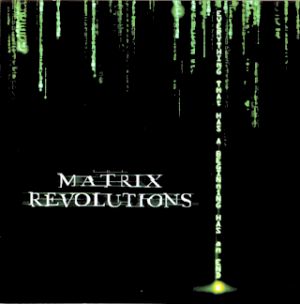************************************************************** EDITOR’s RECOMMENDATION November 2003 **************************************************************
The Matrix Revolutions
Music composed and conducted by Don Davis
with additional music by Juno Reactor
Orchestrations by Don Davis, Erik Lundborg, Conrad Pope
Boy soprano soloist, Zachary Biggs
Song 'In My Head' by Pale 3
Available on Warner Sunset / Maverick 48412-2
Running time: 63.30
Amazon UK Amazon US

The tag line to The Matrix Revolutions reads "Everything that has a beginning has an end." Well here is presumably the final Matrix album, and while general opinion is that the films have got worse with each instalment, the albums have got better and better.
The Matrix offered just half-an-hour of Don Davis' fine score on a disc which was almost entirely overshadowed by an irrelevant rock compilation. The Matrix Reloaded offered a double disc set with considerably more of Davis' score, plus some interesting techno-orchestral collaborations with Juno Reactor. Even the video game album Enter the Matrix (which hasn't been officially released) was an improvement, concentrating entirely on the orchestral side of the Matrix sound, the music being composed very much in Davis style by Erik Lundborg, one of the orchestrators on the films.
And now we have The Matrix Revolutions. There is just over an hour of music. Happily this includes only one "song", a dreadful piece of industrial noise Pale 3. Bar three collaborations with Juno Reactor, two of which follow immediately on from the standard Matrix main title, the rest is pure Don Davis. As the "song" is track four it is possible to begin at track five for a pure Davis experience all the way to the end title, which is thoughtfully sequencing for film score purists. Though if one does chose that option the listener will be missing the thrilling "The Trainman Cometh", which introduces the Trinity theme before exploding into seemingly acoustic rhythmic fury reminiscent of Japanese drumming, but which is presumably the work of Juno Reactor. More Japanese style drumming features heavily in "Tetsujin", until at the halfway mark the familiar techno riff which was a cliché a decade ago makes yet another return to the series. Hackneyed it may be, but the fusion with Davis powerhouse orchestral writing is devastatingly effective.
The score moves into a different gear with the introduction to "The Road to Sourceville", with an opening choral chord which hints and developments to come. Much of what follows will be thoroughly familiar, at least in outline, to followers of the franchise, but where on the Reloaded album a lot of score was lumped together in a rather unwieldy and lengthy suite, here the cues are allowed to breath much more comfortably as self-contained pieces of easily digestible length. The effect is a more manageable listening experience, while what is truly new is the choral writing, not the simple wordless voices over the exhilarating, ferocious "Moribund Mifune", but the full scale choral settings of the finale.
Before that though we get the robust action of "Kidfried", with a relentless hammering rhythm at around the three minute mark evoking Holst's "Mars" and after yet more action in "Saw Bitch Workhorse", the lull before the final storm in "Trinity Definitely". A gentle and deeply melancholy romantic setting of the Trinity music, this may be the most immediately notable track for being the only one devoid of almost continuous uproar. The neo-Wagnarian quality of the orchestration being rather acknowledged by the following title, "Neodämmerung".
And it is with this cue that Davis brings the choir into full play. Where John Williams gave the choral signature to the new Star Wars trilogy, "The Duel of the Fates" Celtic words translated into Sanskrit, Davis brings The Matrix trilogy to an end with extracts from the Upanishads, kept in the original Sanskrit. Blisteringly explosive stuff with more than a hint of Orff's Carmina Burana, it sets the scene for yet more action with "Why, Mr Anderson?" before the joyously uplifting "Spirit of the Universe", a glorious choral celebration which can trace its Sfnal musical routes back through Williams' Close Encounters of the Third Kind, Horner's Brainstorm (1983) and Silvestri's The Abyss (1989), developing into a tense yet triumphant lullaby-like theme which might even be at home at the climax of an Alien movie.
The nine minute "Navaras" finds Davis once more in conflict with Juno Reactor, a bold choral statement introducing the workout like "Duel of the Fates" vs. "O Fortuna" from Carmina Burana before that techno beat kicks in for the last time and what sounds very much like a large helping of Shelia Chandra's Roots and Wings album is thrown into the mix. I may be wrong – it's a long time since I've heard that album, but its certainly what it sounds like. The sudden left-field dive into an Indian soundworld is certainly surprising, and not yet having seen the film I can't say what sort of sense it makes in context. On album its certainly interesting, and the cue continues with more choral writing and a driving piano motif before all the elements come together for a spectacular display of musical fireworks.
There's a lot of densely complex writing to assimilate here, but on the basis of a few early listens I'd have to say that if you are only going to own one Matrix album this is the one to have, while for serious modern film music collectors and fans of the movie trilogy this is an essential purchase.
Gary Dalkin
41/2
See also:
Return to Index